Can you catch Chlamydia without cheating?
Chlamydia, a sexually transmitted infection (STI) caused by the bacterium Chlamydia trachomatis, is one of the most prevalent STIs globally. It’s sometimes called “the silent STI” because of its ability to go undetected for long periods of time.
While the infection is often associated with infidelity or having multiple sexual partners, the reality is more nuanced. It’s entirely possible to contract Chlamydia within the confines of a committed, monogamous relationship, even without any act of unfaithfulness.
In this blog post, we’ll explore how someone can catch or transmit Chlamydia despite remaining faithful to their partner.

How couples can get Chlamydia even if no one’s cheated
One of the primary reasons Chlamydia can be transmitted without cheating is that the infection can remain dormant, or asymptomatic, for an extended period – often for weeks, months, or sometimes years. Indeed, most people with a Chlamydia infection will not experience any symptoms at all.
This means one partner may have unknowingly acquired the infection long before their current relationship began.
Up to 75% of women and 50% of men with Chlamydia experience no telltale symptoms, like genital discharge, painful urination, or pelvic pain.
This is why Chlamydia remains one of the most tested-for STIs – many people don’t know they have it until they get tested.
In 2023, around 57% of all tests or screens provided by Better2Know in the UK included a test for Chlamydia.
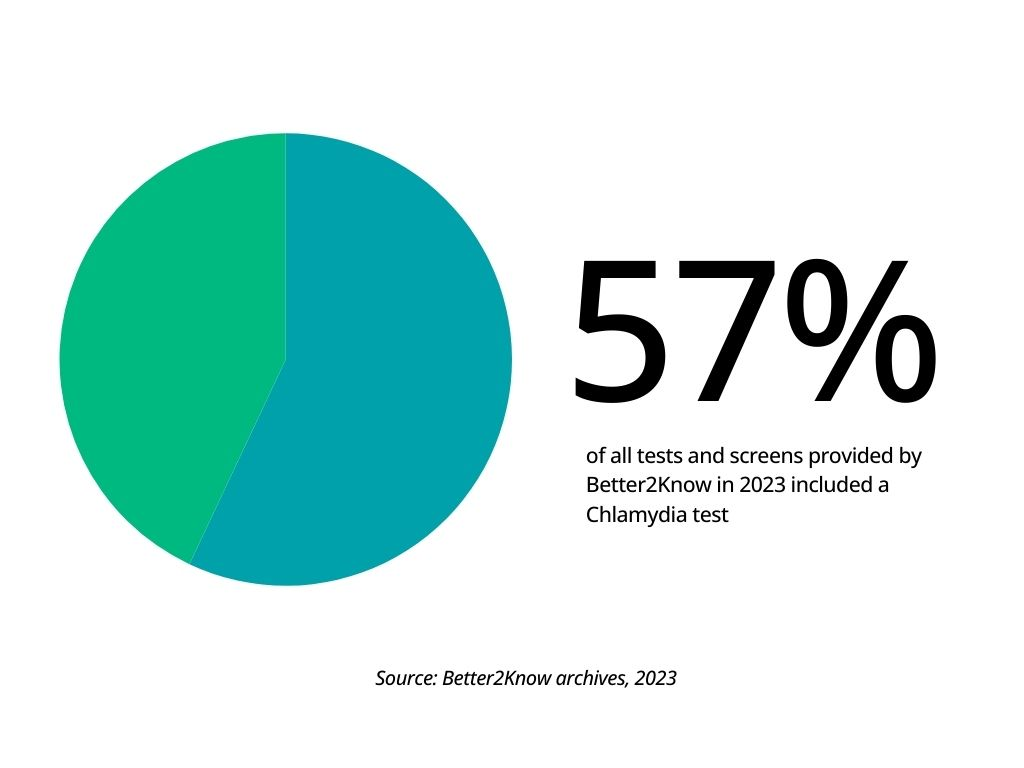
Better2Know recommends that anyone concerned about sexually transmitted infections get tested. Chlamydia is the most common bacterial STI. The more people get tested, the more asymptomatic cases are caught and treated.
In the United Kingdom in 2022, there were 199,233 diagnoses of Chlamydia across all age groups. This represents a 24.3% increase from the 160,279 diagnoses reported in 2021. Among young women aged 15 to 24 years, there were 68,882 Chlamydia diagnoses in 2022, which is a 21.8% increase compared to 2021.
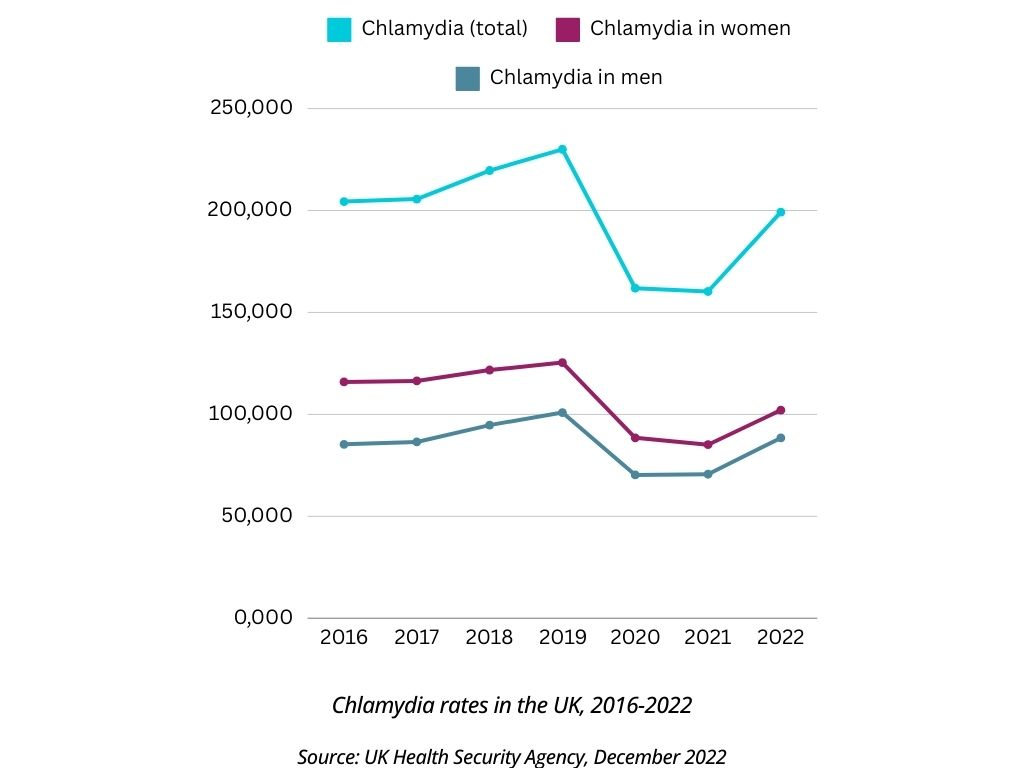
NOTE: The dip in Chlamydia diagnoses in 2020 was likely a result of the COVID-19 pandemic, which limited testing rates across the UK.
Get tested for Chlamydia today.
Varied transmission methods
The vast majority of Chlamydia infections are genital infections contracted through vaginal sex.
In 2023, around 88% of all Chlamydia tests sold by Better2Know were urine tests designed to detect genital infections. The second most common type of test were rectal swabs designed that detected Chlamydia infections of the rectum, usually contracted through anal sex.
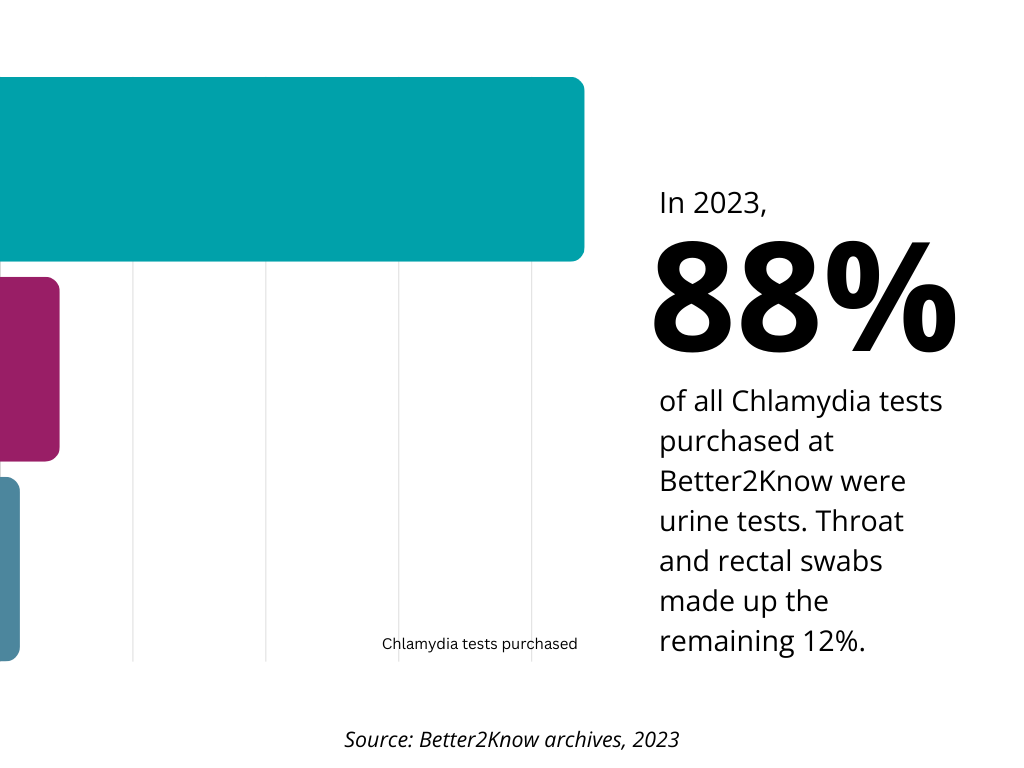
Chlamydia can also spread through other types of sexual contact.
For instance, if you perform oral sex on a partner with a genital Chlamydia infection, you may contract an oral Chlamydia infection. This occurs when the bacteria from the infected genitals infect the mucous membranes in your throat.
Sharing sex toys without proper cleaning and disinfection can also facilitate the spread of Chlamydia between partners. Chlamydia bacteria can stay on a sex toy for several hours if it isn’t washed thoroughly after use.
Despite it being a popular myth, you can’t get Chlamydia from kissing.
My partner and I might have a Chlamydia infection. What should we do?
The last thing anyone in a committed relationship wants to think about is STIs.
But if you suspect that you or your partner have a Chlamydia infection, it’s best to talk to them about it.
Plan what you’re going to say, choose an appropriate time and place, and try to remain calm during the conversation. Don’t jump to conclusions or make snap decisions in the heat of the moment.
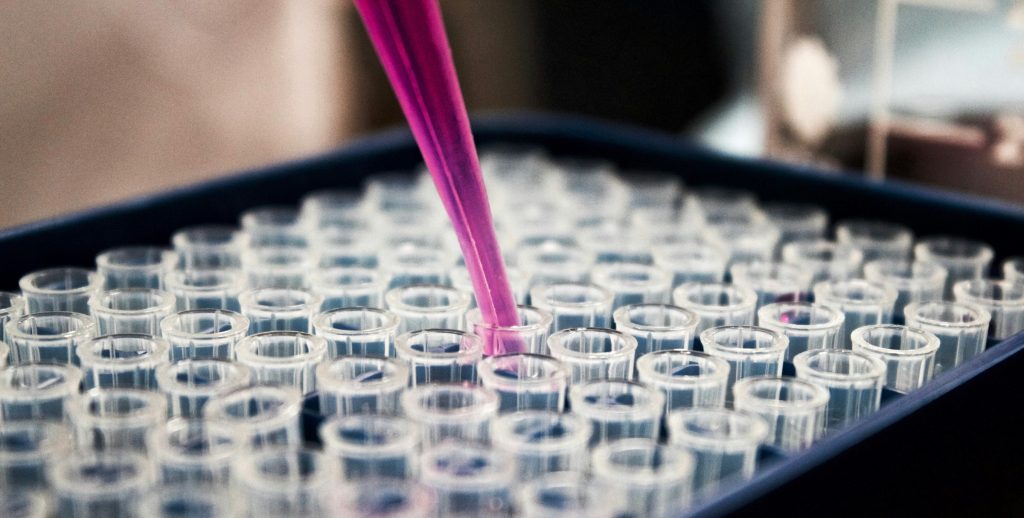
If you and your partner decide to get tested, you can schedule an STI test at a sexual health clinic near you.
However, if either you or your partner test positive, there’s no way to determine how or when either of you got the infection.
This may result in an emotionally challenging situation. Be prepared for this possibility.
This is the reason why, at Better2Know, we recommend that you and your new partner get tested for a full panel of STIs as soon as you are sure the relationship will be ongoing. If either of you test positive for anything like Chlamydia, you can deal with this much more easily than if you wait months or years before testing.
Long-term consequences of untreated Chlamydia
One thing is clear: if you have an STI, it’s always better to know.
If left untreated, Chlamydia can lead to serious long-term health complications, particularly for women.
Pelvic Inflammatory Disease (PID)
Untreated Chlamydia can lead to Pelvic Inflammatory Disease (PID) in women.
When the infection ascends from the cervix to the upper reproductive organs (such as the uterus and fallopian tubes), it causes inflammation and scarring. PID can result in chronic pelvic pain, discomfort, and potentially affect fertility. Early treatment is crucial to prevent PID.
Ectopic pregnancy
Chlamydia significantly increases the risk of ectopic pregnancies.
In an ectopic pregnancy, the fertilised egg implants outside the uterus (usually in the fallopian tube). This condition is dangerous and can be life-threatening.
Infertility
Untreated Chlamydia can cause damage to the fallopian tubes.
Scar tissue and blockages may develop, hindering the normal passage of eggs from the ovaries to the uterus. This scarring can lead to infertility or difficulty conceiving.
In men, Chlamydia can cause epididymitis, an inflammation of the epididymis, affecting sperm production and potentially leading to infertility.
Increased risk of other STIs
Having Chlamydia can make you more susceptible to other STIs, like HIV.
Regular testing, early detection, and timely treatment are essential to prevent these serious complications.
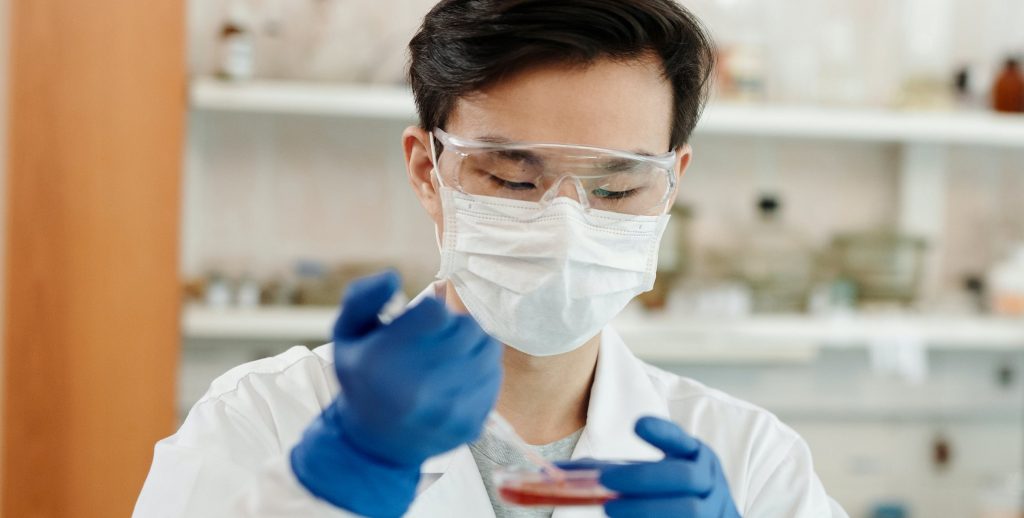
Are you concerned about other STIs than Chlamydia? Try Better2Know’s Full Screen, which tests for 7 different STIs, including HIV, Syphilis, Chlamydia, Gonorrhoea, Hepatitis B, Ureaplasma, and Mycoplasma.
Preventing transmission
While catching Chlamydia without cheating is possible, there are effective steps couples can take to minimise transmission risk.
Get tested routinely
Both partners should undergo STI testing before starting a new sexual relationship and any time there’s a new sexual encounter outside the relationship.
Use condoms consistently
Correct and consistent condom use dramatically reduces the likelihood of spreading Chlamydia and other STIs through vaginal, anal or oral sex.
Avoid sharing personal items
Don’t share potentially contaminated items like sex toys unless they’ve been thoroughly cleaned.
Practice open communication
Maintaining open and honest communication about sexual health, testing, and any potential exposures is crucial for preventing the spread of STIs within a relationship.
Get tested today
It’s understandable that the appearance of an STI during a relationship would cause a lot of worry. But it’s always best to approach these situations with a clear head.
If you think you or your sexual partner have an STI, book a private STI test or screen at a sexual health clinic near you.
If you need help booking your test, you can call the number at the top of this page to speak to one of our trained Sexual Health Advisors. They can talk to you about your situation and help you come up with a course of action that will protect your sexual health.
This blog has been medically reviewed by Dr. Steve Chapman, 02/10/2024.
Categories
- Awards
- Bacterial Vaginosis
- Blood Tests
- Cervical Cancer
- Chlamydia
- Condoms
- Covid-19
- Gardnerella
- Genital Warts
- Gonorrhoea
- Health and Wellness
- Hepatitis A
- Hepatitis B
- Hepatitis C
- Herpes
- HIV
- HIV (AIDS)
- Home Testing
- HPV
- Instant Testing
- MSM
- Mycoplasma
- News
- Non-Specific Urethritis
- PAP Smear
- Pre-Pregnancy
- Sexual Health
- STD Symptoms
- STD Tests and Screens
- STI Transmission
- Stigma
- STIs
- Swab Tests
- Syphilis
- Trichomonas
- Ureaplasma
- WSW
- Zika




